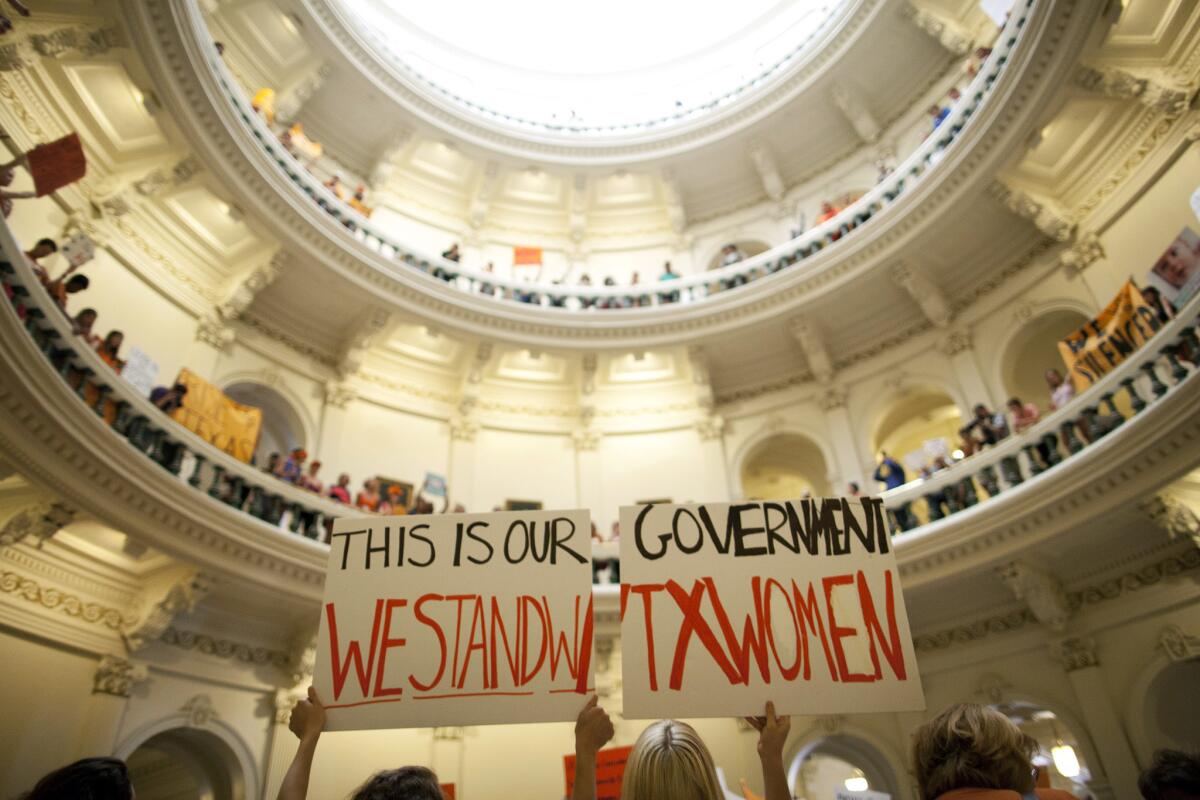Good news and bad news for women as the abortion battle rages on

- Share via
The battle over abortion continues to rage, and both sides got good news this week.
In a win for antiabortion forces Tuesday, an ideologically split Supreme Court refused, 5-4, to stop the implementation of a Texas law aimed at squeezing abortion providers out of the state by requiring doctors to have admitting privileges at local hospitals.
Doctors don’t need admitting privileges; abortions are among the safest medical procedures performed today. Any emergency room physician is capable of handling a post-abortion complication. The law is not in the best interest of women; it’s in the best interest of people who don’t want women to have abortions.
Planned Parenthood has said that a third of the state’s 36 abortion clinics will have to close, forcing women to drive long distances to get abortions. Tough luck, said the Supreme Court, which agreed with a federal appeals court panel that the law was reasonable and did not impose an undue burden on women.
Forcing women to drive 150 miles for a perfectly legal procedure, on my planet, is the equivalent of putting up a roadblock to prevent women from getting abortions. In the real world, it’s a serious burden.
On the other hand, those who favor abortion rights were pleased Tuesday when the citizens of Albuquerque turned out in record numbers to overwhelmingly reject a measure that would have outlawed abortion after the 20th week of pregnancy.
As my colleague Cindy Carcamo reported, it was the first instance of a citywide effort to restrict abortion. More than 87,000 voters cast ballots in the special election, compared with only 70,000 who cast ballots in October’s mayoral election. That’s how emotional this issue is.
And despite many polls that show Americans are far less inclined to allow unrestricted access to abortion in the second trimester of pregnancy, Albuquerque voters said Tuesday it’s a woman’s business-- not the government’s--whether she has an abortion after 20 weeks. The measure went down 45%-55%.
Disturbingly, the measure was the brainchild of Tara and Bud Shaver, antiabortion “missionaries” who moved to New Mexico from Kansas after Wichita abortion doctor George Tiller, one of the few American physicians who performed late-term abortions, was murdered in the vestibule of his church in 2009 by a Christian zealot, after years of harassment and violence by antiabortion extremists.
An Albuquerque clinic, Southwestern Women’s Options, announced it would offer late-term abortions, which are rare, and generally sought by women whose fetuses have conditions that are incompatible with life, or young girls.
“We’ll never back down. We’ll never be silent. We’ll never give up,” Tara Shaver told Carcamo.
And the battle goes on.
Next up: The Supreme Court is expected to decide in the next week or so whether to take up the question of whether a for-profit company can deny its female employees contraception coverage in employer-provided health plans because the company owner has a religious objection.
We’re not talking about religious institutions here. We’re talking about a secular national retailer, in this case the Hobby Lobby crafts store chain, whose owner thinks he should be able to dictate the terms of his employees’ insurance coverage because of his religious convictions.
Back in the mid-1960s, a popular South Carolina barbecue franchise called Piggie Park was sued after it refused to serve black customers for religious reasons. Its owner claimed that God taught him the races should be separate.
A federal district court wholeheartedly embraced the man’s right to practice the religion of his choice. But it said he could not use those beliefs to deny the constitutional rights of others. The Supreme Court agreed.
Will the court stand up for fairness again? At this point, that’s anyone’s guess.
ALSO:
Costco in Simi Valley labels Bibles as fiction; pastor disagrees
Aryan Brotherhood inmate’s death is latest at Victorville prison
Twitter: @robinabcarian
More to Read
Sign up for Essential California
The most important California stories and recommendations in your inbox every morning.
You may occasionally receive promotional content from the Los Angeles Times.











